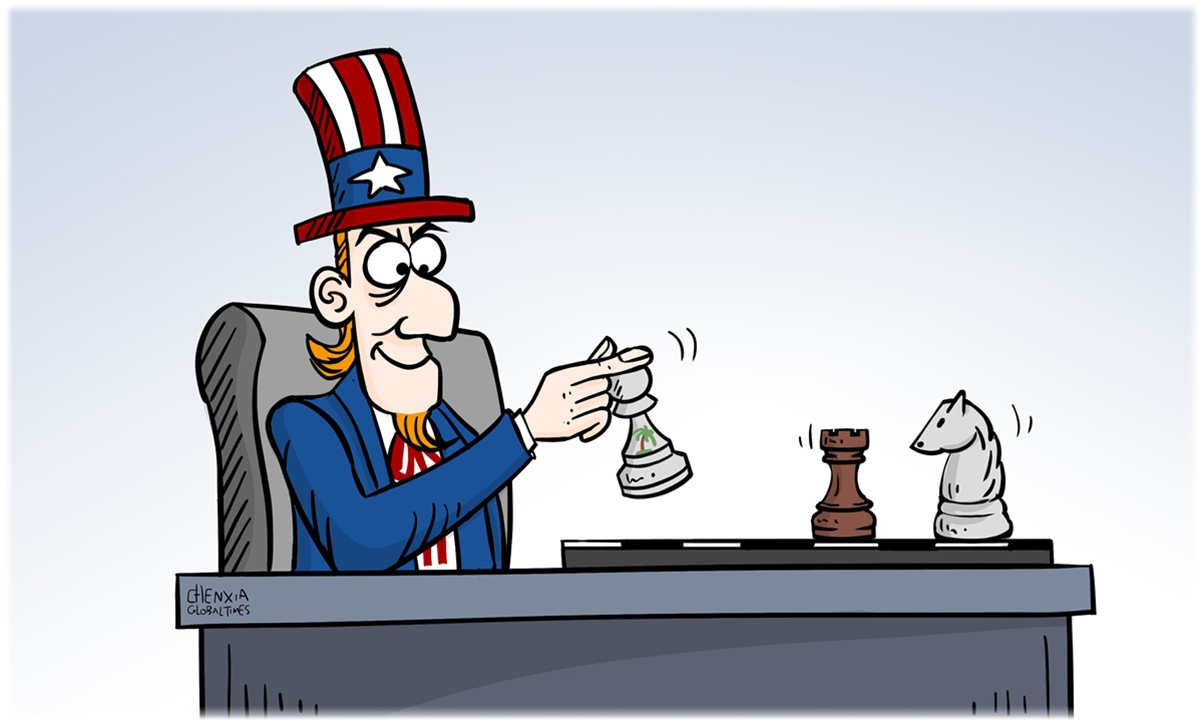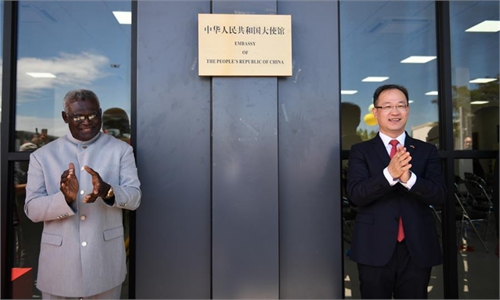
Asia-Pacific Illustration: Chen Xia/GT
It is an open secret that the US and some of its closest allies are pointing their accusing fingers toward China at every turn. China's recent cooperation with the Solomon Islands is one such hot spot issue they concern. These countries are sensitive to almost every move by this Pacific Island country.
The US Coast Guard cutter - Oliver Henry - taking part in Operation Island Chief monitoring fishing activities in the Pacific, which ended on Friday, was denied entry into a port in the Solomon Islands when it sought to make a scheduled stop there to refuel and re-provision, according to US media reports.
Fox News reported that it "raised concerns about China's growing influence in the area," citing tweets from former US Department of Veterans Affairs assistant secretary James Hutton and Gordon Chang, a so-called China hand who is infamous for his "coming collapse of China" predictions. Hutton said that "China is gaining ground in its efforts to gain dominance in the Pacific," while Chang tweeted that "China is running the Solomon Islands."
The Solomon Islands' denial of entry to the US cutter can be seen as a kind of political stance, noted Chen Hong, president of the Chinese Association of Australian Studies and director of the Australian Studies Centre at East China Normal University. The US' intervention in the Solomon Islands' domestic and foreign affairs has undermined the Pacific Island country's national dignity, sparking dissatisfaction among both its people and the government. Furthermore, South Pacific countries, including the Solomon Islands, pursue neutrality and are reluctant to become an instrument for the US and some of its allies to engage in the geopolitical game.
Early this month, Solomon Islands Prime Minister Manasseh Sogavare did not attend a weekend dawn service for a key World War II battle organized by the US, an activity with strong political meaning. The Solomon Islands' denial of US cutter this time conveys a similar message. It is anticipated that similar happenings will repeat for the Pacific Island country, Chen continued.
Therefore, it is very far-fetched for the US to attribute its failure to enter a port of the Solomon Islands to China. "But taking advantage of this failure, Washington wants to stir up another wave of public opinion detrimental to China's cooperation with the Solomon Islands," Qin Sheng, executive research fellow at the Center for Australia, New Zealand and South Pacific Studies, Chinese Academy of Social Sciences, told the Global Times. "There is no doubt that such a manner will only exacerbate the antipathy of the Pacific Island countries against the US and push the Solomon Islands even less willing to cooperate with the US."
The US is apparently not the only country that ramps up attempts to try and smear China-Solomon Islands cooperation, Australia is another one. As a response, the Solomon Islands government reportedly threatened to ban foreign journalists from entering the country if they are not "respectful" or if they engage in "racial profiling" in stories about the Solomon Islands' relations with China. A statement issued by the Solomon Islands government in particular criticized the Australia-based ABC News' reporting of "China's growing presence" in the Pacific island country.
For a long time, ABC News has fabricated stories and chosen one-sided opinions to push forward its anti-China agenda. It has viewed China-related affairs with a colored lens. Its reports on China-Solomon ties are just another instance.
The response from the Solomon Islands indicates that cooperation between China and the Pacific Island nation is transparent. It also serves to warn the US and Western media such as ABC News not to churn out cock-and-bull stories, or the Solomon Islands are capable of disproving such reports, noted Qin.
The counteractions of the Solomon Islands against the US and Australia have won itself applause. Actually, it is not the first country that has refused to become a victim in geopolitical struggles. Many island countries have expressed that the Pacific Ocean needs development and the remedy of climate change, not warships or militarization.
What the Solomon Islands did reflects the mind-sets of most Pacific Island countries. It has set an example for small- and medium-sized countries in the region, and we are expected to see more countries say no to the unreasonable demands and hegemonic practices from the US and its allies.
The author is a reporter with the Global Times. opinion@globaltimes.com.cn


